University Report: Cultural Diversity in Early Learning and Child Care
VerifiedAdded on 2022/08/12
|10
|1889
|17
Report
AI Summary
This report delves into the critical role of cultural diversity in Early Learning and Child Care (ELCC) programs. It emphasizes the importance of understanding and appreciating differences in traditions, race, language, and socio-economic backgrounds in shaping children's development, especially in a multicultural country like Canada. The report explores the necessity of integrating diverse cultures within ELCC settings to foster a sense of belonging and eliminate cultural shock for children, including those from international migrant families. It highlights how ELCC programs support families, promote cultural responsiveness, and create inclusive learning environments through various activities such as storytelling, language support, cultural celebrations, and family involvement. The conclusion underscores the significance of ELCC in building a foundation for children by evaluating different native cultures and knowledge, ultimately contributing to their overall well-being.
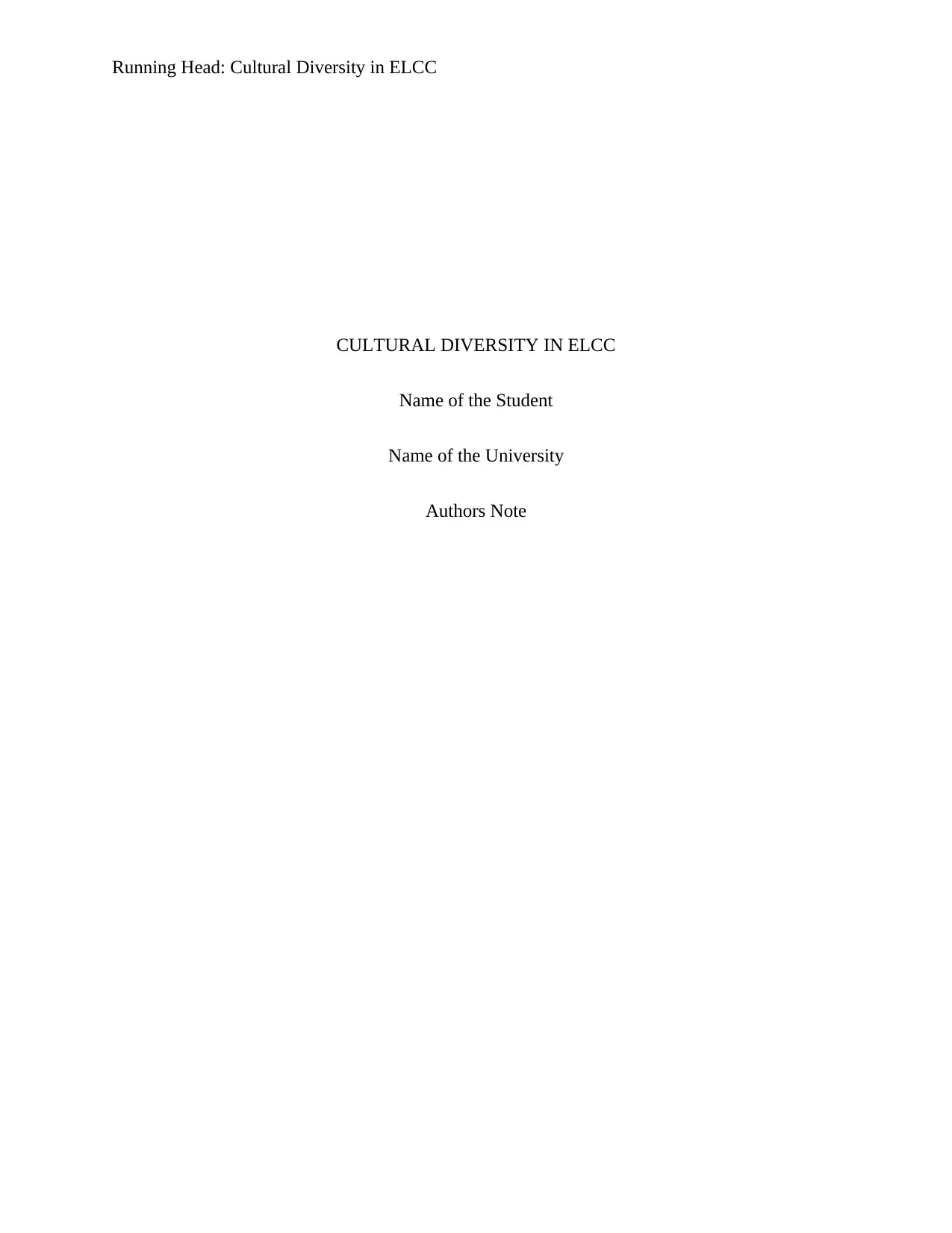
Running Head: Cultural Diversity in ELCC
CULTURAL DIVERSITY IN ELCC
Name of the Student
Name of the University
Authors Note
CULTURAL DIVERSITY IN ELCC
Name of the Student
Name of the University
Authors Note
Paraphrase This Document
Need a fresh take? Get an instant paraphrase of this document with our AI Paraphraser
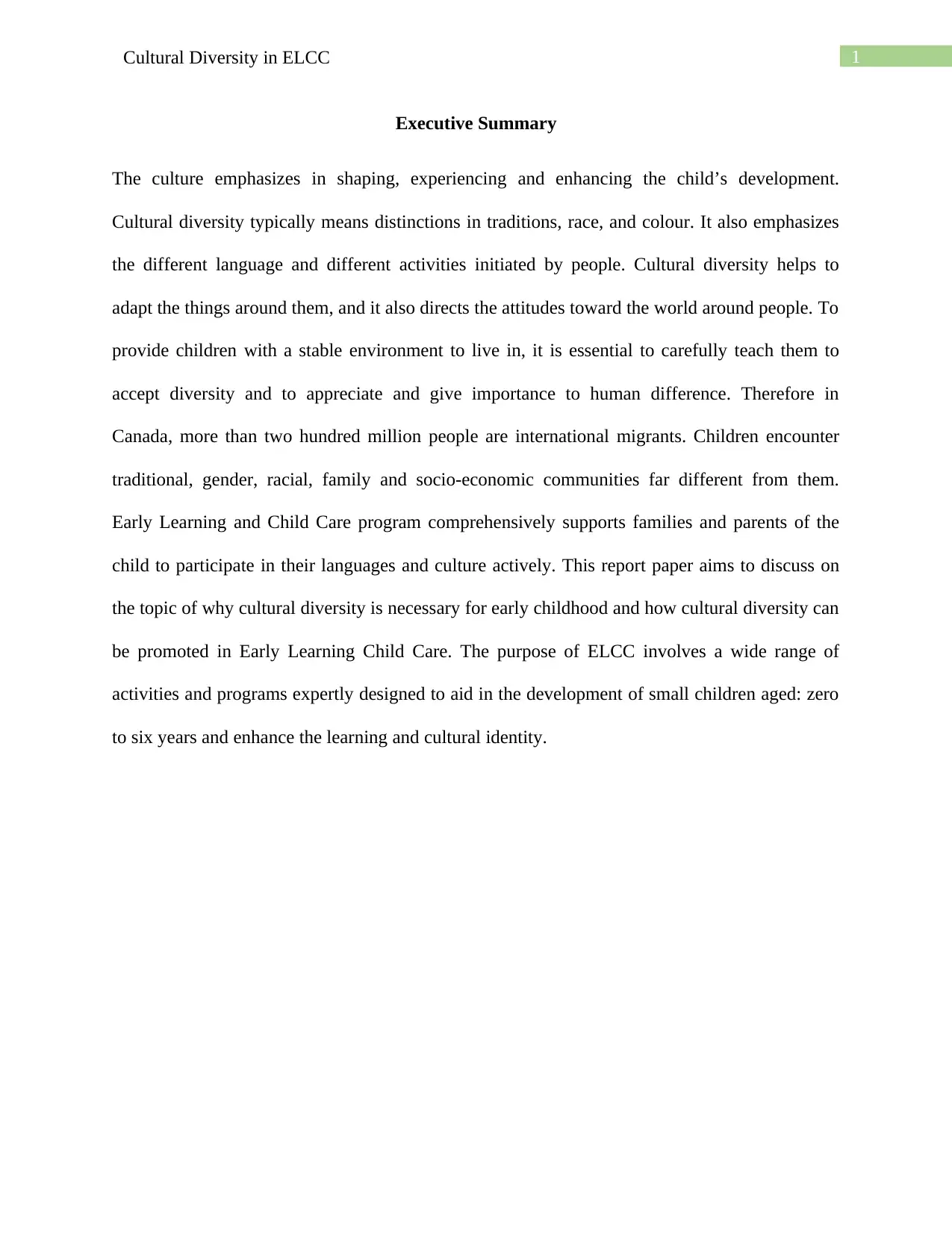
1Cultural Diversity in ELCC
Executive Summary
The culture emphasizes in shaping, experiencing and enhancing the child’s development.
Cultural diversity typically means distinctions in traditions, race, and colour. It also emphasizes
the different language and different activities initiated by people. Cultural diversity helps to
adapt the things around them, and it also directs the attitudes toward the world around people. To
provide children with a stable environment to live in, it is essential to carefully teach them to
accept diversity and to appreciate and give importance to human difference. Therefore in
Canada, more than two hundred million people are international migrants. Children encounter
traditional, gender, racial, family and socio-economic communities far different from them.
Early Learning and Child Care program comprehensively supports families and parents of the
child to participate in their languages and culture actively. This report paper aims to discuss on
the topic of why cultural diversity is necessary for early childhood and how cultural diversity can
be promoted in Early Learning Child Care. The purpose of ELCC involves a wide range of
activities and programs expertly designed to aid in the development of small children aged: zero
to six years and enhance the learning and cultural identity.
Executive Summary
The culture emphasizes in shaping, experiencing and enhancing the child’s development.
Cultural diversity typically means distinctions in traditions, race, and colour. It also emphasizes
the different language and different activities initiated by people. Cultural diversity helps to
adapt the things around them, and it also directs the attitudes toward the world around people. To
provide children with a stable environment to live in, it is essential to carefully teach them to
accept diversity and to appreciate and give importance to human difference. Therefore in
Canada, more than two hundred million people are international migrants. Children encounter
traditional, gender, racial, family and socio-economic communities far different from them.
Early Learning and Child Care program comprehensively supports families and parents of the
child to participate in their languages and culture actively. This report paper aims to discuss on
the topic of why cultural diversity is necessary for early childhood and how cultural diversity can
be promoted in Early Learning Child Care. The purpose of ELCC involves a wide range of
activities and programs expertly designed to aid in the development of small children aged: zero
to six years and enhance the learning and cultural identity.
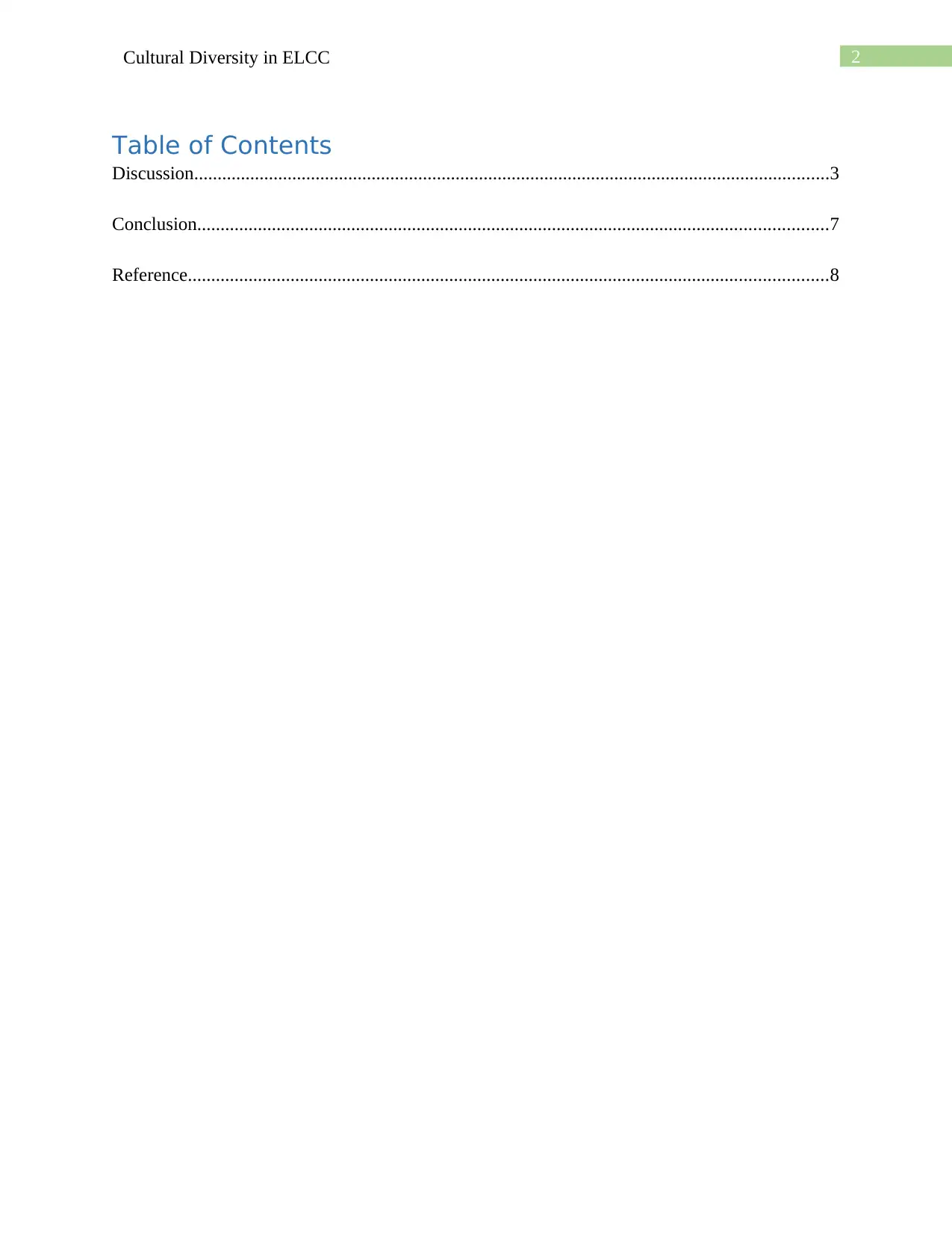
2Cultural Diversity in ELCC
Table of Contents
Discussion........................................................................................................................................3
Conclusion.......................................................................................................................................7
Reference.........................................................................................................................................8
Table of Contents
Discussion........................................................................................................................................3
Conclusion.......................................................................................................................................7
Reference.........................................................................................................................................8
⊘ This is a preview!⊘
Do you want full access?
Subscribe today to unlock all pages.

Trusted by 1+ million students worldwide
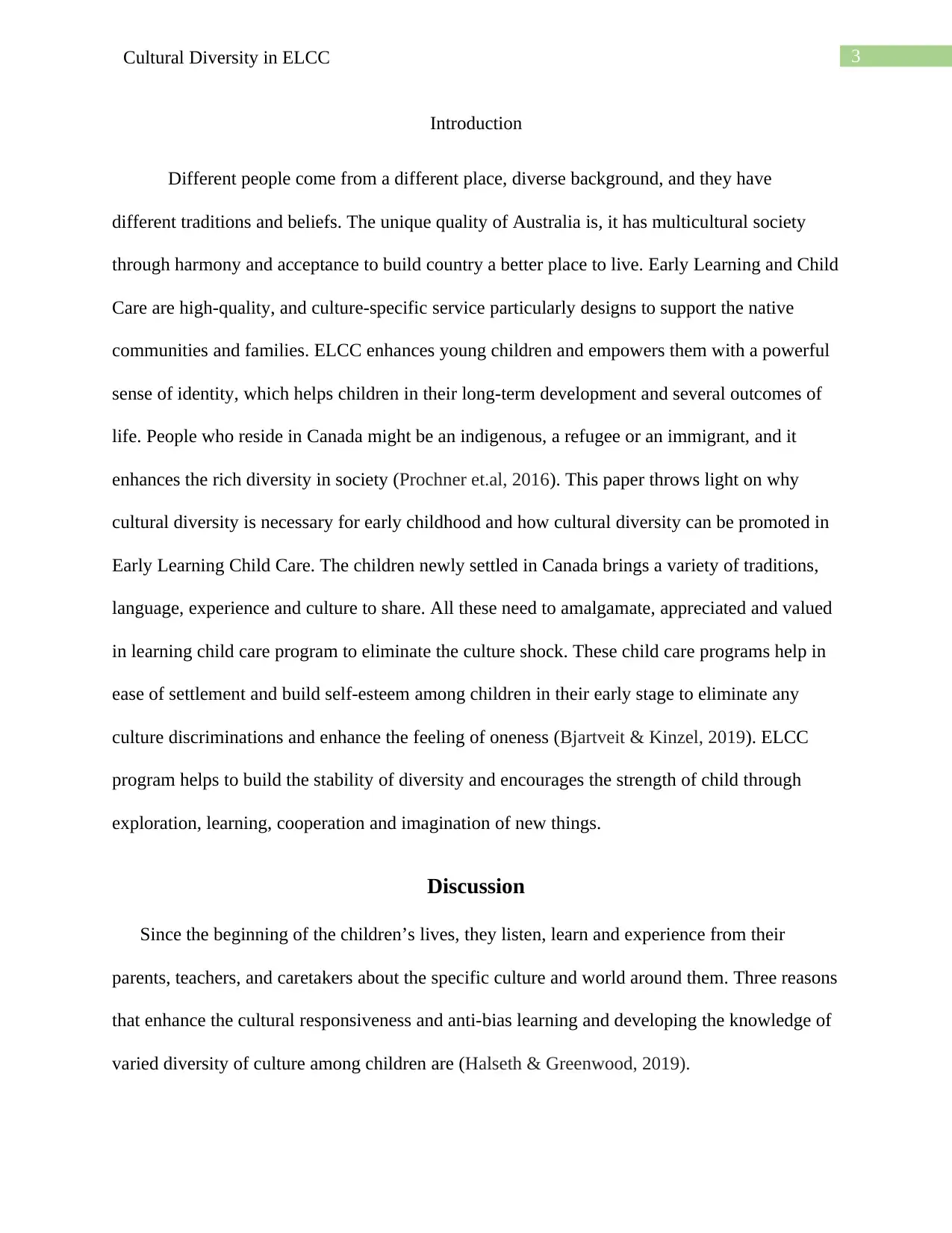
3Cultural Diversity in ELCC
Introduction
Different people come from a different place, diverse background, and they have
different traditions and beliefs. The unique quality of Australia is, it has multicultural society
through harmony and acceptance to build country a better place to live. Early Learning and Child
Care are high-quality, and culture-specific service particularly designs to support the native
communities and families. ELCC enhances young children and empowers them with a powerful
sense of identity, which helps children in their long-term development and several outcomes of
life. People who reside in Canada might be an indigenous, a refugee or an immigrant, and it
enhances the rich diversity in society (Prochner et.al, 2016). This paper throws light on why
cultural diversity is necessary for early childhood and how cultural diversity can be promoted in
Early Learning Child Care. The children newly settled in Canada brings a variety of traditions,
language, experience and culture to share. All these need to amalgamate, appreciated and valued
in learning child care program to eliminate the culture shock. These child care programs help in
ease of settlement and build self-esteem among children in their early stage to eliminate any
culture discriminations and enhance the feeling of oneness (Bjartveit & Kinzel, 2019). ELCC
program helps to build the stability of diversity and encourages the strength of child through
exploration, learning, cooperation and imagination of new things.
Discussion
Since the beginning of the children’s lives, they listen, learn and experience from their
parents, teachers, and caretakers about the specific culture and world around them. Three reasons
that enhance the cultural responsiveness and anti-bias learning and developing the knowledge of
varied diversity of culture among children are (Halseth & Greenwood, 2019).
Introduction
Different people come from a different place, diverse background, and they have
different traditions and beliefs. The unique quality of Australia is, it has multicultural society
through harmony and acceptance to build country a better place to live. Early Learning and Child
Care are high-quality, and culture-specific service particularly designs to support the native
communities and families. ELCC enhances young children and empowers them with a powerful
sense of identity, which helps children in their long-term development and several outcomes of
life. People who reside in Canada might be an indigenous, a refugee or an immigrant, and it
enhances the rich diversity in society (Prochner et.al, 2016). This paper throws light on why
cultural diversity is necessary for early childhood and how cultural diversity can be promoted in
Early Learning Child Care. The children newly settled in Canada brings a variety of traditions,
language, experience and culture to share. All these need to amalgamate, appreciated and valued
in learning child care program to eliminate the culture shock. These child care programs help in
ease of settlement and build self-esteem among children in their early stage to eliminate any
culture discriminations and enhance the feeling of oneness (Bjartveit & Kinzel, 2019). ELCC
program helps to build the stability of diversity and encourages the strength of child through
exploration, learning, cooperation and imagination of new things.
Discussion
Since the beginning of the children’s lives, they listen, learn and experience from their
parents, teachers, and caretakers about the specific culture and world around them. Three reasons
that enhance the cultural responsiveness and anti-bias learning and developing the knowledge of
varied diversity of culture among children are (Halseth & Greenwood, 2019).
Paraphrase This Document
Need a fresh take? Get an instant paraphrase of this document with our AI Paraphraser
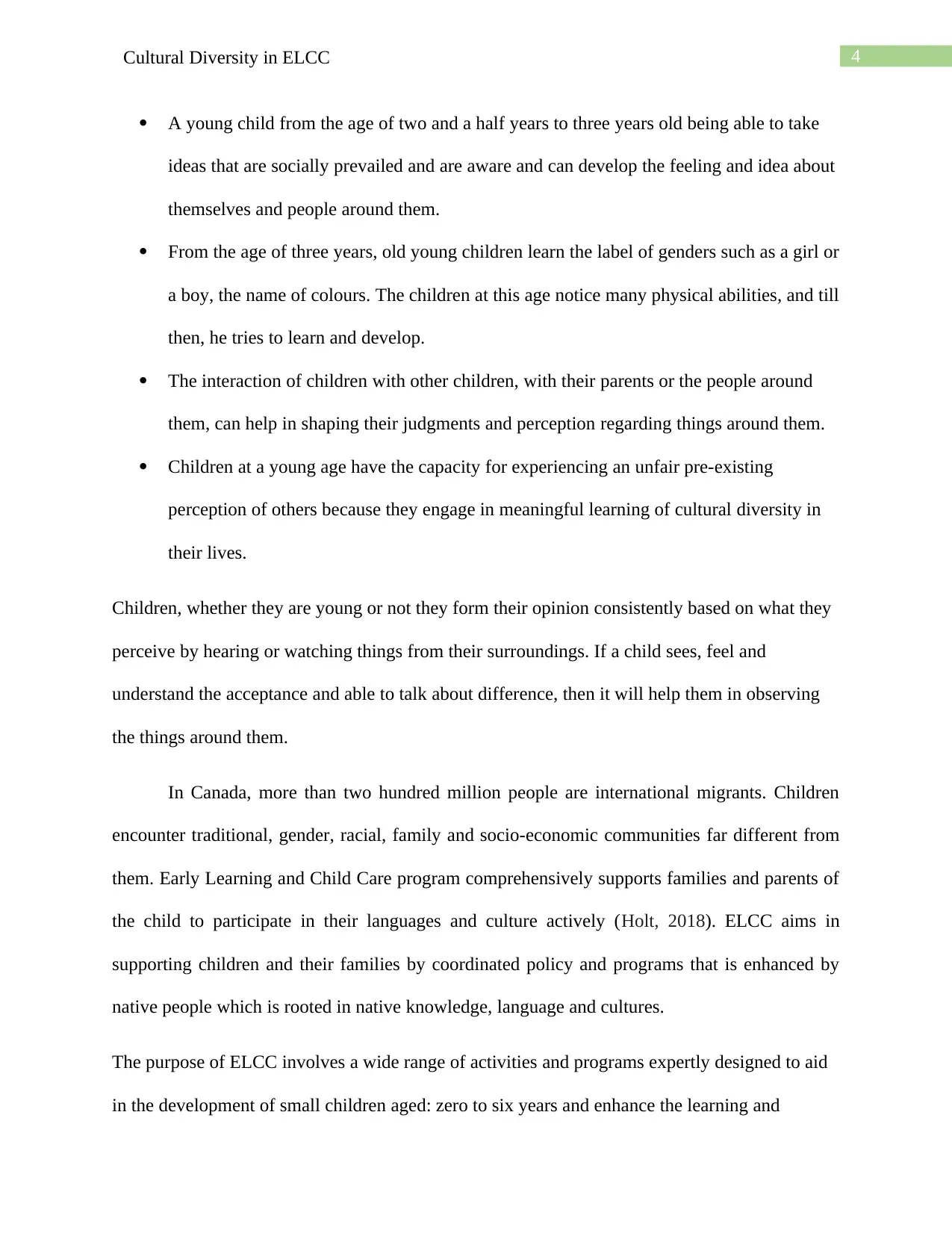
4Cultural Diversity in ELCC
A young child from the age of two and a half years to three years old being able to take
ideas that are socially prevailed and are aware and can develop the feeling and idea about
themselves and people around them.
From the age of three years, old young children learn the label of genders such as a girl or
a boy, the name of colours. The children at this age notice many physical abilities, and till
then, he tries to learn and develop.
The interaction of children with other children, with their parents or the people around
them, can help in shaping their judgments and perception regarding things around them.
Children at a young age have the capacity for experiencing an unfair pre-existing
perception of others because they engage in meaningful learning of cultural diversity in
their lives.
Children, whether they are young or not they form their opinion consistently based on what they
perceive by hearing or watching things from their surroundings. If a child sees, feel and
understand the acceptance and able to talk about difference, then it will help them in observing
the things around them.
In Canada, more than two hundred million people are international migrants. Children
encounter traditional, gender, racial, family and socio-economic communities far different from
them. Early Learning and Child Care program comprehensively supports families and parents of
the child to participate in their languages and culture actively (Holt, 2018). ELCC aims in
supporting children and their families by coordinated policy and programs that is enhanced by
native people which is rooted in native knowledge, language and cultures.
The purpose of ELCC involves a wide range of activities and programs expertly designed to aid
in the development of small children aged: zero to six years and enhance the learning and
A young child from the age of two and a half years to three years old being able to take
ideas that are socially prevailed and are aware and can develop the feeling and idea about
themselves and people around them.
From the age of three years, old young children learn the label of genders such as a girl or
a boy, the name of colours. The children at this age notice many physical abilities, and till
then, he tries to learn and develop.
The interaction of children with other children, with their parents or the people around
them, can help in shaping their judgments and perception regarding things around them.
Children at a young age have the capacity for experiencing an unfair pre-existing
perception of others because they engage in meaningful learning of cultural diversity in
their lives.
Children, whether they are young or not they form their opinion consistently based on what they
perceive by hearing or watching things from their surroundings. If a child sees, feel and
understand the acceptance and able to talk about difference, then it will help them in observing
the things around them.
In Canada, more than two hundred million people are international migrants. Children
encounter traditional, gender, racial, family and socio-economic communities far different from
them. Early Learning and Child Care program comprehensively supports families and parents of
the child to participate in their languages and culture actively (Holt, 2018). ELCC aims in
supporting children and their families by coordinated policy and programs that is enhanced by
native people which is rooted in native knowledge, language and cultures.
The purpose of ELCC involves a wide range of activities and programs expertly designed to aid
in the development of small children aged: zero to six years and enhance the learning and
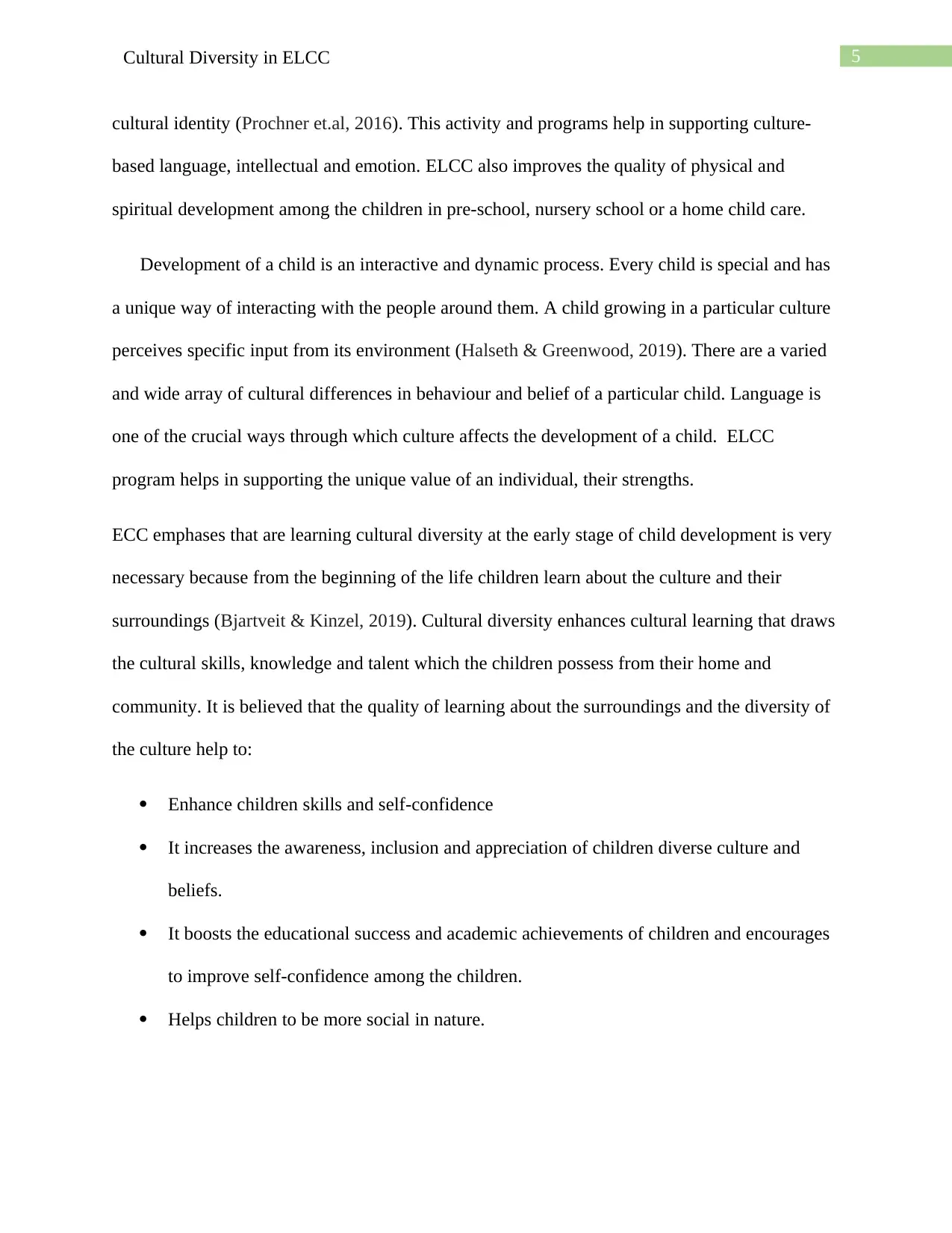
5Cultural Diversity in ELCC
cultural identity (Prochner et.al, 2016). This activity and programs help in supporting culture-
based language, intellectual and emotion. ELCC also improves the quality of physical and
spiritual development among the children in pre-school, nursery school or a home child care.
Development of a child is an interactive and dynamic process. Every child is special and has
a unique way of interacting with the people around them. A child growing in a particular culture
perceives specific input from its environment (Halseth & Greenwood, 2019). There are a varied
and wide array of cultural differences in behaviour and belief of a particular child. Language is
one of the crucial ways through which culture affects the development of a child. ELCC
program helps in supporting the unique value of an individual, their strengths.
ECC emphases that are learning cultural diversity at the early stage of child development is very
necessary because from the beginning of the life children learn about the culture and their
surroundings (Bjartveit & Kinzel, 2019). Cultural diversity enhances cultural learning that draws
the cultural skills, knowledge and talent which the children possess from their home and
community. It is believed that the quality of learning about the surroundings and the diversity of
the culture help to:
Enhance children skills and self-confidence
It increases the awareness, inclusion and appreciation of children diverse culture and
beliefs.
It boosts the educational success and academic achievements of children and encourages
to improve self-confidence among the children.
Helps children to be more social in nature.
cultural identity (Prochner et.al, 2016). This activity and programs help in supporting culture-
based language, intellectual and emotion. ELCC also improves the quality of physical and
spiritual development among the children in pre-school, nursery school or a home child care.
Development of a child is an interactive and dynamic process. Every child is special and has
a unique way of interacting with the people around them. A child growing in a particular culture
perceives specific input from its environment (Halseth & Greenwood, 2019). There are a varied
and wide array of cultural differences in behaviour and belief of a particular child. Language is
one of the crucial ways through which culture affects the development of a child. ELCC
program helps in supporting the unique value of an individual, their strengths.
ECC emphases that are learning cultural diversity at the early stage of child development is very
necessary because from the beginning of the life children learn about the culture and their
surroundings (Bjartveit & Kinzel, 2019). Cultural diversity enhances cultural learning that draws
the cultural skills, knowledge and talent which the children possess from their home and
community. It is believed that the quality of learning about the surroundings and the diversity of
the culture help to:
Enhance children skills and self-confidence
It increases the awareness, inclusion and appreciation of children diverse culture and
beliefs.
It boosts the educational success and academic achievements of children and encourages
to improve self-confidence among the children.
Helps children to be more social in nature.
⊘ This is a preview!⊘
Do you want full access?
Subscribe today to unlock all pages.

Trusted by 1+ million students worldwide
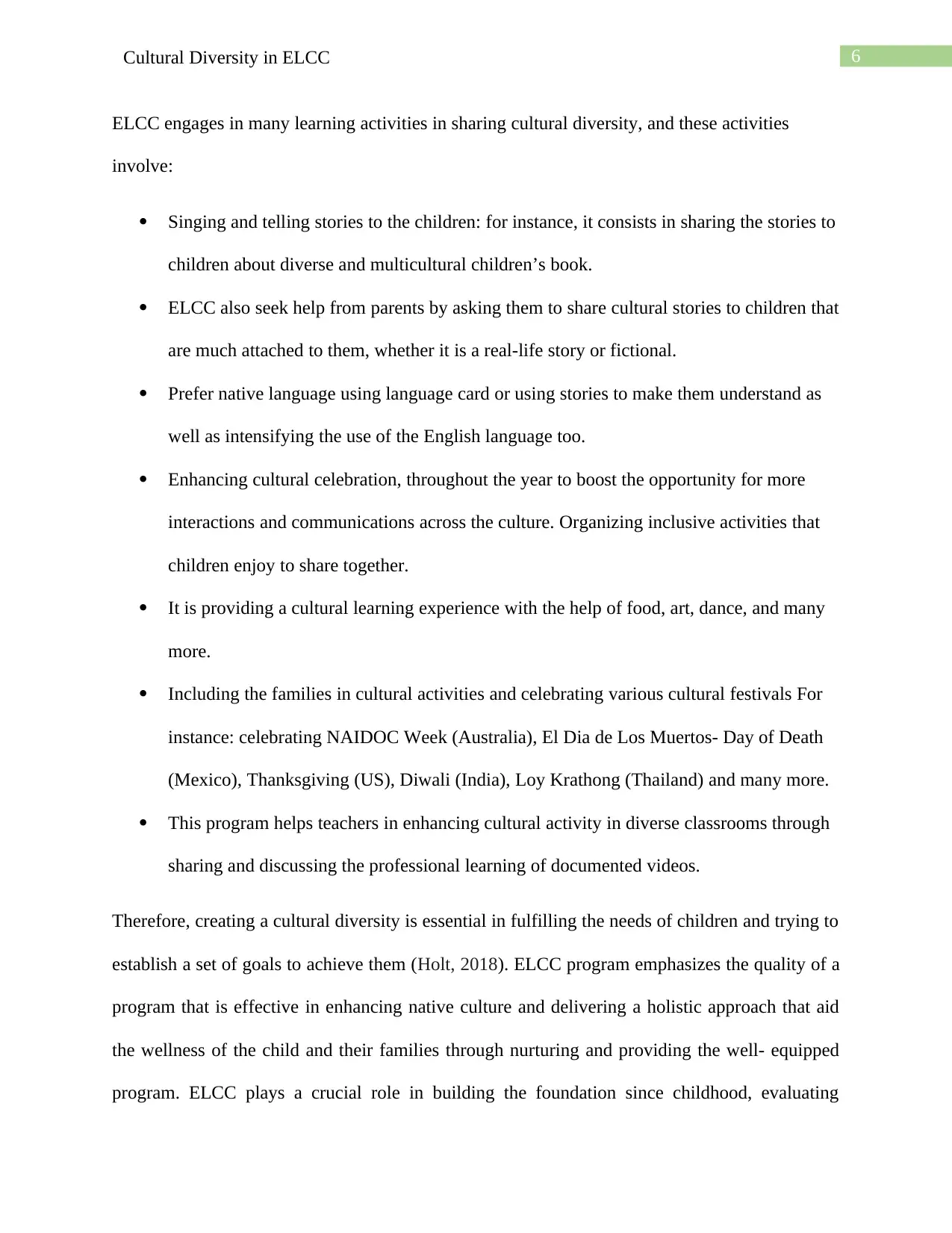
6Cultural Diversity in ELCC
ELCC engages in many learning activities in sharing cultural diversity, and these activities
involve:
Singing and telling stories to the children: for instance, it consists in sharing the stories to
children about diverse and multicultural children’s book.
ELCC also seek help from parents by asking them to share cultural stories to children that
are much attached to them, whether it is a real-life story or fictional.
Prefer native language using language card or using stories to make them understand as
well as intensifying the use of the English language too.
Enhancing cultural celebration, throughout the year to boost the opportunity for more
interactions and communications across the culture. Organizing inclusive activities that
children enjoy to share together.
It is providing a cultural learning experience with the help of food, art, dance, and many
more.
Including the families in cultural activities and celebrating various cultural festivals For
instance: celebrating NAIDOC Week (Australia), El Dia de Los Muertos- Day of Death
(Mexico), Thanksgiving (US), Diwali (India), Loy Krathong (Thailand) and many more.
This program helps teachers in enhancing cultural activity in diverse classrooms through
sharing and discussing the professional learning of documented videos.
Therefore, creating a cultural diversity is essential in fulfilling the needs of children and trying to
establish a set of goals to achieve them (Holt, 2018). ELCC program emphasizes the quality of a
program that is effective in enhancing native culture and delivering a holistic approach that aid
the wellness of the child and their families through nurturing and providing the well- equipped
program. ELCC plays a crucial role in building the foundation since childhood, evaluating
ELCC engages in many learning activities in sharing cultural diversity, and these activities
involve:
Singing and telling stories to the children: for instance, it consists in sharing the stories to
children about diverse and multicultural children’s book.
ELCC also seek help from parents by asking them to share cultural stories to children that
are much attached to them, whether it is a real-life story or fictional.
Prefer native language using language card or using stories to make them understand as
well as intensifying the use of the English language too.
Enhancing cultural celebration, throughout the year to boost the opportunity for more
interactions and communications across the culture. Organizing inclusive activities that
children enjoy to share together.
It is providing a cultural learning experience with the help of food, art, dance, and many
more.
Including the families in cultural activities and celebrating various cultural festivals For
instance: celebrating NAIDOC Week (Australia), El Dia de Los Muertos- Day of Death
(Mexico), Thanksgiving (US), Diwali (India), Loy Krathong (Thailand) and many more.
This program helps teachers in enhancing cultural activity in diverse classrooms through
sharing and discussing the professional learning of documented videos.
Therefore, creating a cultural diversity is essential in fulfilling the needs of children and trying to
establish a set of goals to achieve them (Holt, 2018). ELCC program emphasizes the quality of a
program that is effective in enhancing native culture and delivering a holistic approach that aid
the wellness of the child and their families through nurturing and providing the well- equipped
program. ELCC plays a crucial role in building the foundation since childhood, evaluating
Paraphrase This Document
Need a fresh take? Get an instant paraphrase of this document with our AI Paraphraser
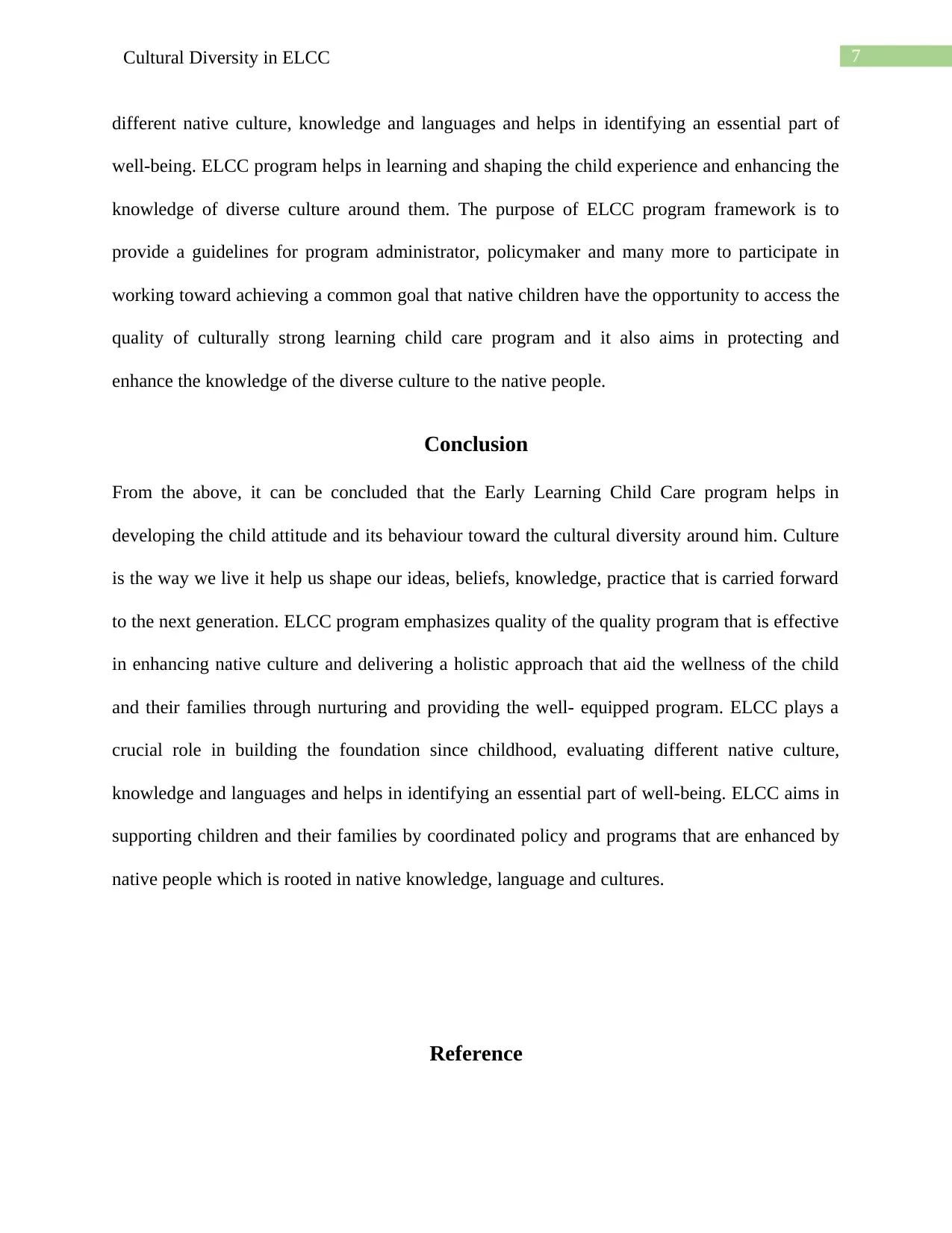
7Cultural Diversity in ELCC
different native culture, knowledge and languages and helps in identifying an essential part of
well-being. ELCC program helps in learning and shaping the child experience and enhancing the
knowledge of diverse culture around them. The purpose of ELCC program framework is to
provide a guidelines for program administrator, policymaker and many more to participate in
working toward achieving a common goal that native children have the opportunity to access the
quality of culturally strong learning child care program and it also aims in protecting and
enhance the knowledge of the diverse culture to the native people.
Conclusion
From the above, it can be concluded that the Early Learning Child Care program helps in
developing the child attitude and its behaviour toward the cultural diversity around him. Culture
is the way we live it help us shape our ideas, beliefs, knowledge, practice that is carried forward
to the next generation. ELCC program emphasizes quality of the quality program that is effective
in enhancing native culture and delivering a holistic approach that aid the wellness of the child
and their families through nurturing and providing the well- equipped program. ELCC plays a
crucial role in building the foundation since childhood, evaluating different native culture,
knowledge and languages and helps in identifying an essential part of well-being. ELCC aims in
supporting children and their families by coordinated policy and programs that are enhanced by
native people which is rooted in native knowledge, language and cultures.
Reference
different native culture, knowledge and languages and helps in identifying an essential part of
well-being. ELCC program helps in learning and shaping the child experience and enhancing the
knowledge of diverse culture around them. The purpose of ELCC program framework is to
provide a guidelines for program administrator, policymaker and many more to participate in
working toward achieving a common goal that native children have the opportunity to access the
quality of culturally strong learning child care program and it also aims in protecting and
enhance the knowledge of the diverse culture to the native people.
Conclusion
From the above, it can be concluded that the Early Learning Child Care program helps in
developing the child attitude and its behaviour toward the cultural diversity around him. Culture
is the way we live it help us shape our ideas, beliefs, knowledge, practice that is carried forward
to the next generation. ELCC program emphasizes quality of the quality program that is effective
in enhancing native culture and delivering a holistic approach that aid the wellness of the child
and their families through nurturing and providing the well- equipped program. ELCC plays a
crucial role in building the foundation since childhood, evaluating different native culture,
knowledge and languages and helps in identifying an essential part of well-being. ELCC aims in
supporting children and their families by coordinated policy and programs that are enhanced by
native people which is rooted in native knowledge, language and cultures.
Reference
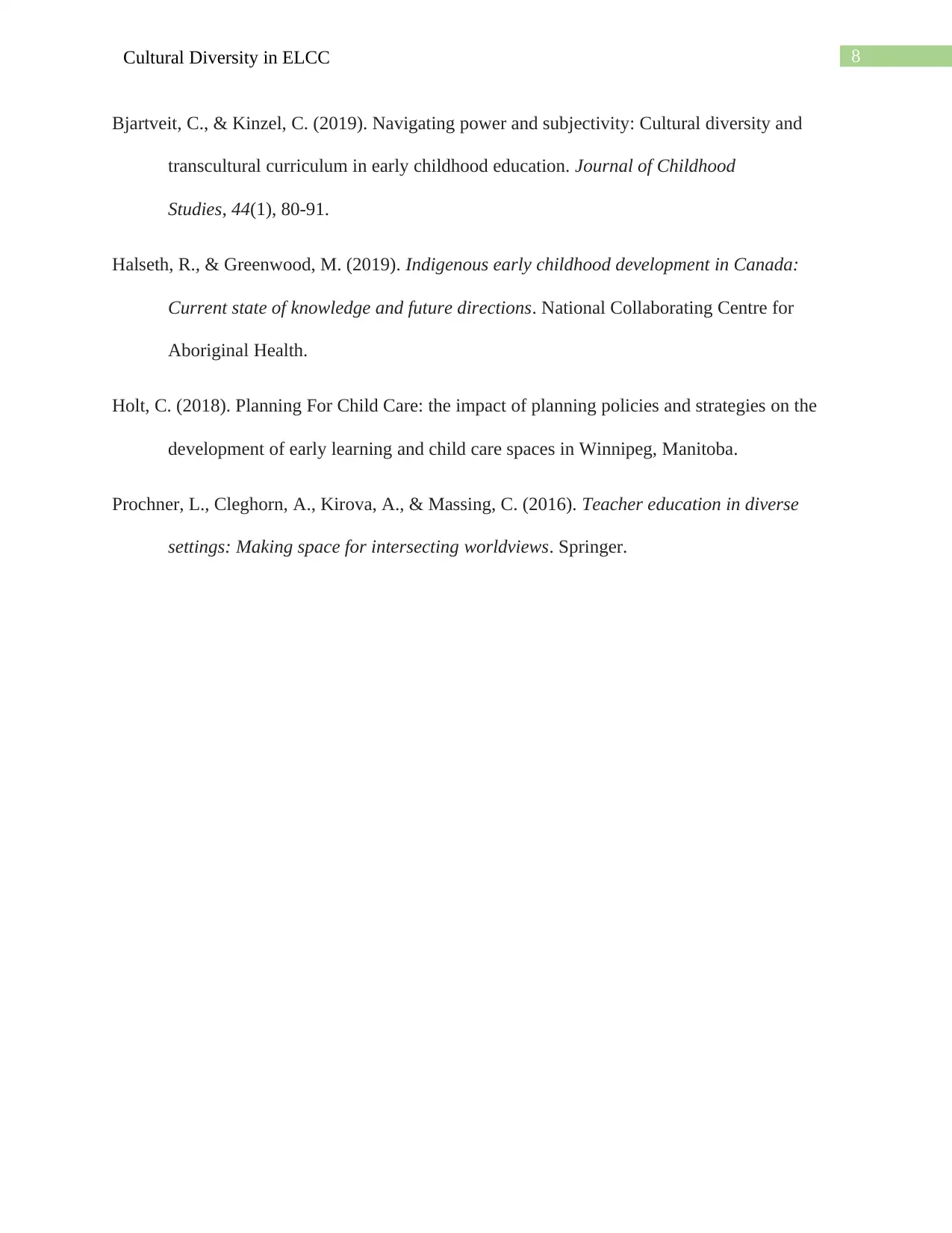
8Cultural Diversity in ELCC
Bjartveit, C., & Kinzel, C. (2019). Navigating power and subjectivity: Cultural diversity and
transcultural curriculum in early childhood education. Journal of Childhood
Studies, 44(1), 80-91.
Halseth, R., & Greenwood, M. (2019). Indigenous early childhood development in Canada:
Current state of knowledge and future directions. National Collaborating Centre for
Aboriginal Health.
Holt, C. (2018). Planning For Child Care: the impact of planning policies and strategies on the
development of early learning and child care spaces in Winnipeg, Manitoba.
Prochner, L., Cleghorn, A., Kirova, A., & Massing, C. (2016). Teacher education in diverse
settings: Making space for intersecting worldviews. Springer.
Bjartveit, C., & Kinzel, C. (2019). Navigating power and subjectivity: Cultural diversity and
transcultural curriculum in early childhood education. Journal of Childhood
Studies, 44(1), 80-91.
Halseth, R., & Greenwood, M. (2019). Indigenous early childhood development in Canada:
Current state of knowledge and future directions. National Collaborating Centre for
Aboriginal Health.
Holt, C. (2018). Planning For Child Care: the impact of planning policies and strategies on the
development of early learning and child care spaces in Winnipeg, Manitoba.
Prochner, L., Cleghorn, A., Kirova, A., & Massing, C. (2016). Teacher education in diverse
settings: Making space for intersecting worldviews. Springer.
⊘ This is a preview!⊘
Do you want full access?
Subscribe today to unlock all pages.

Trusted by 1+ million students worldwide

9Cultural Diversity in ELCC
1 out of 10
Related Documents
Your All-in-One AI-Powered Toolkit for Academic Success.
+13062052269
info@desklib.com
Available 24*7 on WhatsApp / Email
![[object Object]](/_next/static/media/star-bottom.7253800d.svg)
Unlock your academic potential
Copyright © 2020–2026 A2Z Services. All Rights Reserved. Developed and managed by ZUCOL.



![Diploma in Early Childhood Education Assignment - [University Name]](/_next/image/?url=https%3A%2F%2Fdesklib.com%2Fmedia%2Fimages%2Fim%2F9ec57b9d282b457796267c3de395758c.jpg&w=256&q=75)

